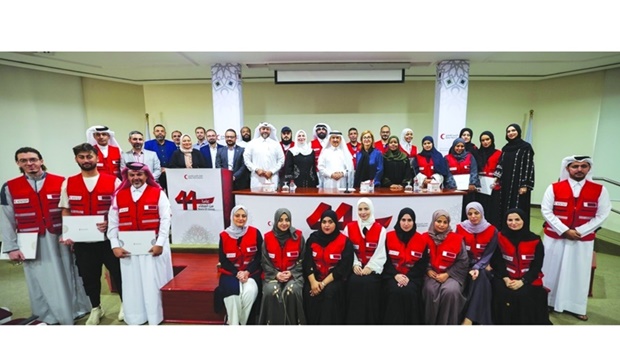Qatar Red Crescent Society (QRCS) has concluded a five-day specialised training course on protection, psychosocial support and restoring family links (RFL), held in partnership with the International Organisation for Migration (IOM) and the International Committee of the Red Cross (ICRC).
The closing ceremony of the course was attended by Ali bin Hassan al-Hammadi, secretary-general of QRCS; Iman Ereiqat, chief of the IOM Mission in Qatar; and Cherine Pollini, head of the ICRC Mission in Qatar.

In his speech, al-Hammadi said, “I believe that the importance of this course lies in the nature of the topics discussed. The trainees were provided with valuable information and experience in psychosocial support and RFL, two key areas of humanitarian work needed for relief personnel on the field. The graduates of this course are qualified to participate actively in foreign relief missions in the future."
“This is not the first training workshop and will not be the last one,” he added. “QRCS has a high-quality year-round training programme designed to provide relief workers and volunteers with the latest scientific developments in humanitarian and relief work, as well as to enhance their skills in the various specialisations they are supposed to practice. This way, they will be prepared to respond to any disaster or humanitarian crisis, both locally and internationally, acting as good representatives of Qatar among their fellow humanitarians."
Al-Hammadi thanked IOM and ICRC for their contributions to this training course, making it such an extraordinary success. He described the event as “one more episode of continuous cooperation on major humanitarian causes and goals of common interest”.
Ereiqat expressed her happiness with the region’s first-of-its-kind training course, which brought together IOM’s mission in Qatar, QRCS, and ICRC. She commended the three organisations’ humanitarian role wherever there are disasters, being always prepared to lend a helping hand.
She added: “I hope that this course has built the trainees’ skills with the international expertise available. Later on, when they are on the field, this will serve as an information repository for them to be excellent humanitarians wherever the need arises. Hopefully, this training course will be a good start for humanitarian projects and a strategic partnership among the three parties to serve humanity in every possible way."
Pollini said: “This week went very well. I had the opportunity to attend some of the sessions, and I would like to thank the trainers and organisers. Various sessions on different topics were taught. I also had the opportunity to witness a lot of participation, and that is very important. This is how we learn. Beyond this training, other trainings will come up, through which we can develop and enhance the knowledge and exchanges. It is a beautiful example of co-operation among the different institutions, and that is something to be celebrated."
The closing ceremony of the course was attended by Ali bin Hassan al-Hammadi, secretary-general of QRCS; Iman Ereiqat, chief of the IOM Mission in Qatar; and Cherine Pollini, head of the ICRC Mission in Qatar.
The five-day specialised training course focused on protection, psychosocial support and restoring family links.
In his speech, al-Hammadi said, “I believe that the importance of this course lies in the nature of the topics discussed. The trainees were provided with valuable information and experience in psychosocial support and RFL, two key areas of humanitarian work needed for relief personnel on the field. The graduates of this course are qualified to participate actively in foreign relief missions in the future."
“This is not the first training workshop and will not be the last one,” he added. “QRCS has a high-quality year-round training programme designed to provide relief workers and volunteers with the latest scientific developments in humanitarian and relief work, as well as to enhance their skills in the various specialisations they are supposed to practice. This way, they will be prepared to respond to any disaster or humanitarian crisis, both locally and internationally, acting as good representatives of Qatar among their fellow humanitarians."
Al-Hammadi thanked IOM and ICRC for their contributions to this training course, making it such an extraordinary success. He described the event as “one more episode of continuous cooperation on major humanitarian causes and goals of common interest”.
Ereiqat expressed her happiness with the region’s first-of-its-kind training course, which brought together IOM’s mission in Qatar, QRCS, and ICRC. She commended the three organisations’ humanitarian role wherever there are disasters, being always prepared to lend a helping hand.
She added: “I hope that this course has built the trainees’ skills with the international expertise available. Later on, when they are on the field, this will serve as an information repository for them to be excellent humanitarians wherever the need arises. Hopefully, this training course will be a good start for humanitarian projects and a strategic partnership among the three parties to serve humanity in every possible way."
Pollini said: “This week went very well. I had the opportunity to attend some of the sessions, and I would like to thank the trainers and organisers. Various sessions on different topics were taught. I also had the opportunity to witness a lot of participation, and that is very important. This is how we learn. Beyond this training, other trainings will come up, through which we can develop and enhance the knowledge and exchanges. It is a beautiful example of co-operation among the different institutions, and that is something to be celebrated."

